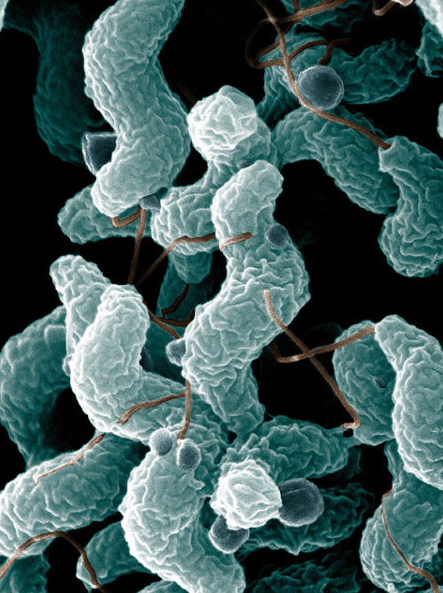Backyard Chickens: Ten Tips for Dealing With Bacterial Food Poisoning
Campylobacter
jejuni is a bacteria that is a primary source of food poisoning around the globe. The bacteria is common in chickens and is easily spread
through their feces. Often, chickens carry the disease but show no outward
signs of infection.
Presence
& Source of Contamination
In
2005, the U.S. Food & Drug Administration (FDA) tested raw chicken breasts and found that 47% of samples
contained Campylobacter.* While some cross-contamination is possible, the
high level of Campylobacter indicates that the bacteria is widespread in commercial
poultry flocks.
 |
| Microscope photo of Campylobacter bacteria. These nasty little devils can cause stomach cramps and diarrhea. Photo by USDA |
Backyard
flocks can also harbor the disease. According to a research done in 2009 at by the
University of Delaware, about 11% of backyard flocks tested positive for
Campylobacter.** This is not really surprising since Campylobacter can be transmitted
to chickens by a wide variety of sources:
- Domestic and farm animals including dogs and cats, ducks, turkeys, sheep, and cattle.
- Wild birds
- Insects such as beetles and fleas.
- Mice and rats.
- Environmental sources such as ponds, puddles, streams and soil.
Once
infected, chickens can pass the bacteria to uninfected birds via their
feces. A study published in the February 2013 issue of Poultry
Science*** showed that Campylobacter stays viable for up to 6 days. The bacteria’s survival time suggests that
chicken feces are an important reservoir of infection and can create a
permanent source of infection.
Ten Tips for Dealing with
Campylobacter
While
most people get sick from eating contaminated meat, it is possible to get sick
from touching poultry or eggs that have come into contact with poultry feces.
Here
are ten tips are for controlling Campylobacter and limiting your risk of
getting sick:
- Fence off your coop and run with poultry wire to prevent wild birds and other animals from transmitting Campylobacter to your flock.
- Remove your bird's poultry food at night to discourage mice and other rodents from visiting your run.
- Provide 1 nest box for every 4 hens in your flock to help keep eggs clean.
- Change nest box bedding regularly to also keep eggs clean.
- Provide safe water. If you wouldn't want to drink it, don't give it to your chickens.
- Protect your bird's water supply from fecal contamination. If you use a traditional waterer, make sure it is raised off the ground to limit contamination. Consider switching to a completely covered waterer like the BriteTap poultry waterer since it completely shields your chicken's water supply from dirt and droppings.
- If you use chicken bedding to make compost, make sure you get the compost pile hot to help kill harmful bacteria.
- If you add chicken manure directly to your garden, be careful to wash any produce taken from the same area for at least a week since Campylobacter can remain active in droppings for 6 days.
- Wash your hands after handling poultry or eggs.
- If your eggs are soiled by droppings, wash them prior to placing them in the refrigerator. For more information about egg washing, check out our previous article, Should You Wash Your Eggs.
Sources:
* Reported in the July 6, 2012 Oregon Public Health CD Summary Report.
**Campylobacter jejuni, coli, and lari prevalence in wild birds and backyard poultry, Judith Keller, Masters Thesis, 2009, University of Delaware
***Survival of Campylobacter jejuni in naturally and artificially contaminated laying hen feces, M.F.M Ahmed, J Schulz, and J. Hartung, Poultry Science, February, 2013.


Comments
Post a Comment